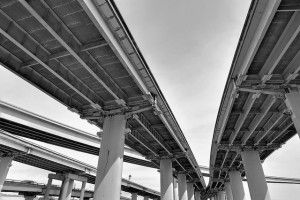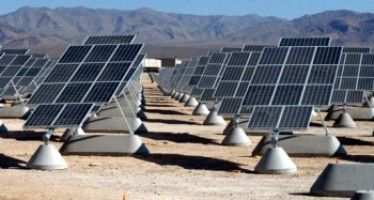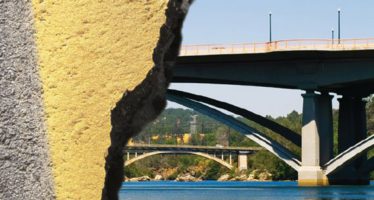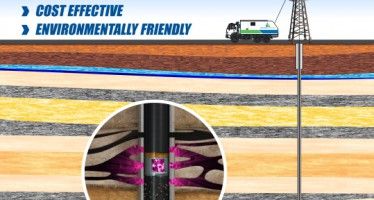CA’s road funding plans ‘stuck in traffic’

Daniel Parks / flickrMore than a month after Gov. Jerry Brown called for lawmakers to hold a “special session” on transportation funding, California still doesn’t have a plan for how to close its annual $5.7 billion shortfall for road, bridge and highway repairs.
More than a month after Gov. Jerry Brown called for lawmakers to hold a “special session” on transportation funding, California still doesn’t have a plan for how to close its annual $5.7 billion shortfall for road, bridge and highway repairs.
Brown said in his Inaugural Address in January that fixing the shortfall was a top priority in 2015. He referenced a $59 billion backlog in deferred maintenance, but that sum could balloon, transportation experts say, if bridge and road repair projects are neglected and require infrastructure replacement.
“All the data out there shows our roads are deteriorating, both at the state and local levels, at an alarming pace,” said Jim Earp, executive director of the California Alliance For Jobs. “If we don’t address it, the costs will skyrocket.”
Road reconstruction costs are tenfold higher than proper maintenance, added Earp, whose organization represents construction companies and unions.
While this debate is centered at the Capitol, its implications will be felt across the Golden State where motorists stand to pay a hefty price as roads get worse.
Driving on roads in need of repair costs California drivers $18.4 billion a year in extra vehicle repairs and operating costs, according to TRIP, a national nonprofit transportation research group based in Washington, D.C.
That amounts to an average of $762 per California motorist, and is hundreds of dollars more per year than motorists in Nevada, New York and Texas pay.
A report released by TRIP last week showed 15 metro areas in California rank among the nation’s worst for road pavement conditions. Those rough roads mean big bucks for drivers in San Francisco and Los Angeles, where the associated vehicle maintenance costs top $1,000 annually, according to the report.
Tax increases
This year, Democratic lawmakers have submitted a range of ideas to plug the funding gap, and ultimately start fixing more roads.
They include a $10 billion plan by Assembly Speaker Toni Atkins, D-San Diego, to charge all drivers a $52 annual road user fee.
Her five-year plan would also accelerate loan repayments from the state’s general fund that are owed to transportation accounts. Additionally, it would free up $1 billion per year by returning truck weight fees to transportation funds instead of using them to repay debt owed by state government.
Also in the mix is San Jose Democratic Sen. Jim Beall’s SB16, which would raise the gas tax by 10 cents per gallon, bump up the vehicle registration fee by $35 annually while also charging a new $100 annual fee for zero-emission vehicles.
The 10-cent increase would leave California with the highest gas tax in the nation.
Republicans, meanwhile, say they have no appetite for tax hikes and want to use existing funds to pay for the state’s crumbling road infrastructure.
Sen. Jeff Stone, R-Riverside, lashed out at California officials for their years of diverting money from transportation repairs after an Interstate 10 bridge collapsed earlier this month during a severe storm east of Coachella.
Built in 1967, the bridge was listed as “functionally obsolete” on the 2014 National Bridge Inventory, meaning it was no longer considered adequate for the high volume of traffic it handled. The listing did not mean the bridge was inherently unsafe, but instead was built to outdated capacity standards.
“It was one of hundreds of bridges across our state in need of replacement or repair,” Stone said in a press release. “Maintenance and repairs of California’s bridges and highways have been neglected far too long. Millions of taxpayer dollars, approved by voters to build and maintain our bridges and highways, have been siphoned away to programs that have nothing to do with infrastructure, transportation or highway safety.”
Out the door without a plan
Lawmakers held two special sessions in early July, then left the Capitol for a month-long recess a week later without a firm plan for moving forward.
Some, including Earp, said progress was made.
“I think there’s some good karma going on,” Earp said. “There’s a much greater chance that something will get done than we’ve had in quite a while. There’s a lot of traction on it.”
Still, getting a two-thirds vote in the Legislature for any new taxes will be a “heavy lift,” Earp noted.
Republicans in the Assembly are frustrated that Democrats waited until this summer to make transportation funding a priority rather than dealing with it in the spring budget process given the state’s higher revenue totals.
Some are less-than-optimistic that a deal will be reached, unless key pieces of their plans are incorporated, a GOP spokeswoman said.
“We’re stuck in proverbial political traffic,” Amanda Fulkerson, spokeswoman for the Assembly Republican Caucus, said.
Republicans in the Assembly proposed the following to raise $6.6 billion for road repairs:
- Dedicate 40 percent of the funds in California’s cap-and-trade program, generating $1 billion annually
- Use existing funds from vehicle weight fees, for $1 billion annually
- Invest half the governor’s strategic growth fund into shovel-ready road projects, for $200 million annually
- Eliminate redundancies at Caltrans, saving $500 million annually
- Eliminate 25 percent of the state’s long-term unfilled employee positions, saving $685 million annually
- Make a $1 billion commitment in the state general fund for transportation
The road ahead
The next round of special session meetings won’t start until lawmakers return to the Capitol Aug. 17, at the earliest.
From the initial sessions, it appears lawmakers want “a portfolio approach” taking the best pieces from existing plans rather than looking for just one solution, said Jay Day, chief of staff for Assemblyman Jim Frazier, D-Oakley. Frazier is chair of the assembly’s special session panel tasked with addressing the problem.
Day added that ultimately lawmakers need to fashion a bill that’s to the liking of Gov. Jerry Brown, who has said he doesn’t favor another transportation bond.
They won’t have much time. The deadline for the Legislature to pass bills is Sept. 11.
“Everything’s on the table,” Day said of funding options. “We’re in dire need. We have a nearly $6 billion shortfall every year.”
Contact reporter Chris Nichols at [email protected] or on Twitter @ChrisTheJourno
Related Articles
Solar power causing problems with electricity grid
One theme CalWatchdog.com has covered is how solar power can cause problems to the state’s existing electricity grid. An investigation a year
Bridge woes compound California infrastructure troubles
Dams aren’t the only part of California infrastructure on the hot seat. Following a big-ticket Sacramento request for federal
Oil tech for CA: From Russia, with love?
On Jan. 1 California’s fracking law drills in – just as the price of oil has dropped to its lowest




